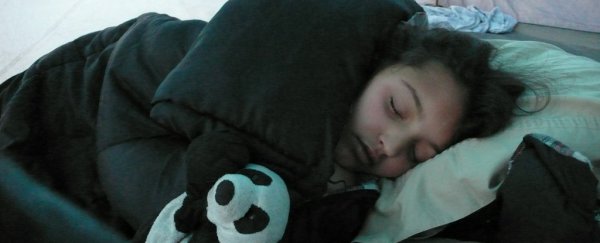This article was written by Derk-Jan Dijk from the University of Surrey, and was originally published by The Conversation.
Sleeping in over the weekend is one of life's great pleasures. Yet some of us are much better at it than others. A teenager is much more likely to emerge from their bed at midday than their middle-aged parents – but even within age groups, individual differences exist. Why is this? It's well-known that teenagers tend to sleep later than mature adults, and we all have our natural rhythms. But we're not actually the slaves to our body clocks you might think.
If you find getting out of bed on a Sunday hard even after a long night's sleep, there may be something you can do about it.
The body clock generates rhythms so that we are alert during the day while body temperature is high and sleep at night while body temperature is low. This clock has evolved to match the cycle of light and dark, and associated cycles of temperature, for example, created by Earth's rotation. But what happens now that artificial light means that we are in control of this cycle?
Seeing the light
Back in the 1960s, Jurgen Aschoff and Rutger Wever studied sleep and body temperature rhythms in humans. They placed volunteers in windowless basements and underground bunkers with no access to the natural 24-hour light and dark cycle and no timepieces.
In most experiments, the lights were turned on continuously and volunteers had no control over the light-dark cycle (except by closing their eyes during sleep). But in some experiments, the volunteers could turn off the lights when they wanted to go to sleep and on again when they woke up. Those volunteers in control of the light-dark cycle found their sleep patterns and the rhythm of their core body temperature shifted to later in the day. And in more than 40 percent of these cases, sleep was no longer synchronised with their body temperature.
Hunter-gatherers who only have campfires as sources of artificial light go to sleep several hours after sunset and wake up around dawn. But while the light of a small fire won't influence our body clock, the artificial light we are exposed to in the evening can. Specifically, it prevents the synthesis of the sleep-facilitating hormone melatonin and suppresses sleepiness.
 Fighting against the clock. Shutterstock
Fighting against the clock. ShutterstockWhen you stay up well past sunset and then have to go to work the next morning, you wake up because of the alarm clock not because your body is ready. But it's not the alarm clock's fault that you're not getting enough sleep. In a way we place ourselves in an Aschoff-Wever bunker every evening. Why turn off the lights and go to bed when you are not sleepy? You'd rather continue to work, socialise or relax.
As a result, your body clock is driven out of synch with the natural light-dark cycle. At the weekend, you may go to sleep at the same time or even later, and then sleep until you have paid-off your sleep debt and your body clock finally tells you that it is time to wake up.
This difference in sleep timing between the working week and the weekend has been referred to as social jet lag. It is often implied that it is our early work schedules or early school times or our body clocks that are causing the problems, but that doesn't follow from the example above. Our ability to disrupt our body clocks with powerful artificial light is at least partly to blame.
Catching up
The difference between sleep duration during the week and the weekend is greatest in adolescents and young adults and then declines steadily as we get older. This is partly because our need for sleep actually declines with age. Teenagers may need 9 hours or more but this falls to 7 or 8 by the time you reach your fifties.
So even when a teenager and middle-aged person have similar work and sleep schedules during the week, the accumulated sleep debt and difference between week and weekend sleep will be greater in the adolescent.
Yet within a group of adults of similar ages, some will sleep later and longer during the weekend than others. Without the confounding effects of artificial light, some of us have naturally fast body clocks that effectively run for less than 24 hours, and many of us have slow clocks that run for more than 24 hours. Those with a slow clock, delay sleep more during the week and then sleep longer during the weekend.
There are also other individual differences that can contribute to the variation in weekend sleep habits. Some of us are more sensitive to evening light than others, meaning our melatonin is suppressed to a greater extent. This can lead to later bedtimes, a greater sleep debt, a later clock and ultimately later and longer sleeps over the weekend.
By taking a biological perspective on the regulation of sleep timing and recognising how we have divorced ourselves from the natural world and influenced our biology in unwanted ways by behavioural choices, we may understand individual differences in weekend sleep habits.
So don't just blame your alarm clock. By making more time for sleep during the week, reducing excessive light exposure in the evening and by making sure you see some light in the morning, you may reduce your social jet lag and wake up feeling more refreshed.
![]() Derk-Jan Dijk, Professor of sleep and physiology, director of Surrey Sleep Research Centre, University of Surrey.
Derk-Jan Dijk, Professor of sleep and physiology, director of Surrey Sleep Research Centre, University of Surrey.
This article was originally published by The Conversation. Read the original article.
